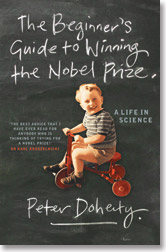Peter Doherty was awarded the Nobel Prize for Physiology and Medicine in 1996, and was named Australian of the Year in 1997. He is one of only two Australian Nobel Laureates, or noble lorikeet as his grand daughter calls him, and the only one living in Australia.
The Beginner's Guide to Winning the Nobel Prize
The pursuit of excellence
The pursuit of excellence

Genre:
IN A WORLD WHERE fewer and fewer students study science, this marvellous book might just re-dress the balance. By exploring the Nobel Prize, its history, and its effect on science and scientists around the world, Peter Doherty gives a fascinating insight into the passion, determination and creativity that drives so many scientists. He argues that science is about illuminating truth and promoting causes that link us together as human beings.
With a lively style and ever-questioning mind, he explores areas such as where science has brought us, how research is practiced and funded, and where science might take us in the future. Along the way, Doherty addresses such fundamental questions as whether Nobel Prize winners are just lucky and why scientists and born again Christians can’t get along.
Peter Doherty won the Nobel Prize for Physiology and Medicine in 1996 for his work on T-cells, and was Australian of the Year in 1997. His new book, A Light History of Hot Air is due out in October.


